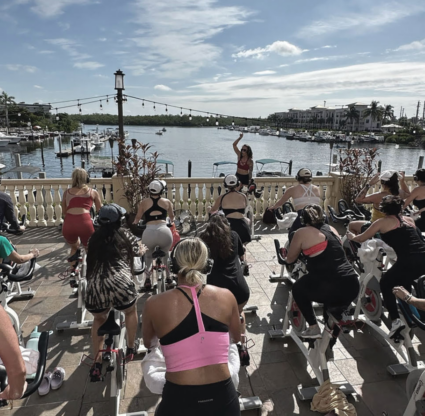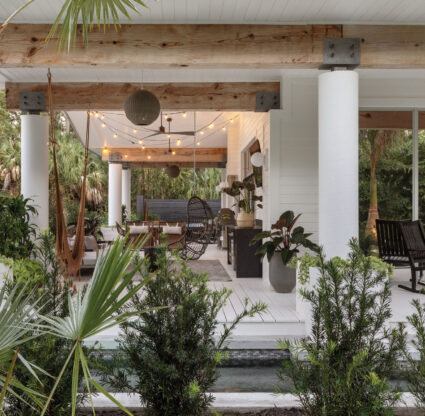The fatigue hit me with a thunk one October morning. Or, more technically, I hit it. I was backing out of my driveway—late, frenzied and blind to the car straddling my neighbor’s lawn. Double dents—in my bumper and in that of the unfortunate houseguest, a teenage girl who had the misfortune of witnessing both the mishap and the obscenity-laced tirade that followed. The worst part? I had made the exact same mistake a couple of years before, exiting a parking space and whacking a pickup. Same state of mind—exhausted, overscheduled (and blood-sugar-crashing, if I recall, because I was in too big of a rush to stop and eat).
I am bad in reverse. Also, I am a very slow learner.
The girl’s car was a cheap fix, and by some neighborhood magic, the dent in my car disappeared one night shortly thereafter. But I knew that even if the damage were erased, this time it needed not to be forgotten.
I’ve read lots of stories of women who go on life-changing journeys of self-affirmation and spirituality and whole-self makeover.
This is not one of those stories because:
(a) I do not have the time, the money or the inclination to halt everything to go eat my way through Italy, pray my way through India or backpack my way across the Pacific Crest.
(b) I detest self-indulgence.
(c) I reject anything with a catchphrase or hashtag. #selfcare! Ugh.
(d) I have a really nice life. I just get really tired.
Although on paper that sounds trivial, the fatigue and the frenzy really do mess with my sense of well-being, my productivity, my patience, my decision-making. And my driving.
I’ve made many attempts at self-improvement over the years—usually big and inflexible plans that demand much time and commitment. Not only do they fizzle out, they stress me out. Taking on big pledges amounts to just one more thing that I have to accomplish every day. I am tired of accomplishing. So, for once, I am thinking small. About little lifestyle and attitudinal tweaks that could amount to a big impact.
My schedule goes something like this: Up at 5 a.m., to work by 7 a.m. (I commute from Fort Myers to Naples), home by 4:30 p.m., dinner (whipped together and eaten in shifts), transport to activities (the kids’ and my own), transport home from activities, cleaning, more cleaning (how are we so messy?), preparations for the next work/school day. In between come grocery shopping, laundry, attendance at my two daughters’ events and whatever else the day summons. Once in a while, my husband and I slip in a date night. (For the record, he does his share of parenting and chores, but he somehow never seems as frazzled as I am.)
I run a second life, too, as a dancer. In typical type A fashion, it is not enough for me to take a ballet class now and again. I teach and choreograph and perform—all of which bring me great joy, but add to the complexity of working motherhood.
You’d think I’d relish the freedom of an unscheduled day. But I have to confess: Lack of structure stresses me out, too. Which of my undone chores should I tackle? If I have time for leisure, which long-denied activity should I pick? What do the girls need? How late can I afford to sleep (and how badly will I kick myself if I stay in bed too long)? For how many minutes will I indulge in a book before my brain kicks in: You need to do this… You ought to do that…
I had to find my “off” button.
My editor, who’d asked me to write a piece on personal well-being, inquired where I would go to quiet my soul, expecting an answer like a day spa or a morning in the woods or a waterfront table at the beach.
Nowhere, I told him.
To try to schedule something, to add one more commitment would simply add to the stress. What’s more, such remedies are temporal—how long before a post-massage “Aahhh…” turns back into a Munch-like “AAHHH!”?
Besides, I miss my house.
So on a Sunday morning, I settle into my favorite spot, the loveseat in my Florida room. I’ve lit a fragranced candle, poured a mug of coffee and opened my latest New Yorker magazine. I’d set the alarm to wake up, which sounds like anathema to this whole relaxation idea, but one of my stressors is the neglect of my introverted side. Quiet moments like this are as restful to me as sleep.
I’m pressing my newfound off button, deliberately averting the mental to-do list. Or, more precisely, I’ve rearranged my priorities to put this quiet moment at the top of the day’s agenda. Why should housework outrank “me time”?
I know why, of course. Every woman does. We’re groomed from toddlerhood to put others first. My friends and I used to get up early to dress and “feed” our Cabbage Patch Kids before heading to elementary school. I am not troubled by the hierarchy of needs that puts family over self. To flip it would disturb my soul, not soothe it.
Small tweaks. Compromises. Thirty minutes in a quiet house by candle.
I have a longstanding battle with the word “enough.”
If I say I’m fit enough, my cooking is healthy enough, my house is clean enough, my writing is good enough, my choreography intricate enough, am I protecting myself from excessive angst—or shortchanging myself?
Last winter vacation, I took a yoga class at a resort. I surveyed instructor and participants from the back of the room with an inward groan. This would certainly not be enough to sustain me. Not enough of a challenge, not enough rigor to break a sweat even.
I didn’t want to walk out (it was bad enough I’d arrived late), and so, quietly I reached for the ceiling, as instructed. Right arm, left arm, both arms. I softened my knees and rolled my torso downward until the world turned upside down. “This is not about touching the floor,” the instructor intoned. She must be talking to me—me whose inclination is to grab the back of my calves and tug forward until my chest meets my thighs.
That morning, though, I heeded her. I just hung, arms dangling, gravity releasing the knots in my neck and shoulders. She prompted us to breathe, slowly, deeply, sending oxygen to limbs, organs, joints. We held poses just long enough for the muscles to release, no plank-pose-for-5-minutes, no added pushups between downward-facing dog and upward-facing dog.
An hour later, my muscles glowed and I was awash in calm.
I told you I am a slow learner, but this lesson I embraced readily. These days, I do 20 minutes of quiet stretching and deep breathing in the mornings. I no longer scramble to finish a video from my collection of fitness DVDs (or kick myself for failing to do so). I don’t track my progress. Most days I don’t even change out of my pajamas.
It is enough.
My neighbor and I pulled in to our respective driveways simultaneously one Friday night. “Just bought a bottle of wine, Jen,” he called from across the street. His wife and I have a penchant for cabernet. It was late; my younger daughter and I had just finished at the dance studio, my older daughter and my husband were at a softball game. The house was a wreck, and I had an early-morning commitment.
 But I had sensed a growing detachment among my tight-knit neighbors. When the kids were younger, we used to gather outside and chat endlessly while they played. The kids don’t need such minding anymore, everyone’s workload has magnified, and driveways sit empty for long stretches.
But I had sensed a growing detachment among my tight-knit neighbors. When the kids were younger, we used to gather outside and chat endlessly while they played. The kids don’t need such minding anymore, everyone’s workload has magnified, and driveways sit empty for long stretches.
That evening, I pushed responsibility aside and curled up in an oversized chair in front of my friends’ fire bowl. My husband and our girls would later join us.
We all realized, I think, the need to reconnect. In March, we threw a St. Patrick’s Day party. In April, we hid eggs for the kids. In May, we gathered for our annual Cinco de Mayo bash. On the last day of school, we threw an ice cream social. In June, we rented a giant water slide and lit the barbecue grill. I’ve ceased caring if the house is clean before people show up.
Friends and family. That’s what nurtures a soul.
My hardest time of day is the blink-and-you’ll-miss-it stint between getting home and getting back in the car for evening activities. Unless I quit dancing (not gonna happen) or scale back my daughters’ activities (also not gonna happen), there’s little opportunity to catch a break.
Little tweaks, remember? Compromises. In this case, I made a scheduling flip. I quit trying to cram in food prep immediately after work and instead cook around 9 p.m., storing the meal for the next day’s dinner. Yes, this is robbing from my too-short window for sleep, but the adjustment gives my girls a more attentive, less harried mom. I’ve redirected the after-work hour to debriefing the school day, sipping cups of tea and sitting down to eat—rather than gobbling down a snack on the way out the door. My stomach, incidentally, is thanking me. I imagine my blood pressure is, too.
Added bonus: My husband, who works later in the day than I do, and whichever daughter is done her homework contribute to late-night cooking sessions. Family conversation flows much better around a stove than it does around a TV.
I have had plenty of setbacks. One spring morning around 6 a.m., I emailed my editor apologetically, saying I could not manage the drive to Naples (see, I am learning). The previous few days had been a whirl of work and after-school demands and trying to pick up extra duties for my husband, who was buried under a major project at work.
I’d been adhering as best as I could to my stress-easing strategies, but I’d crammed in too much, slept too little, and let my mind revert to its anxious state.
I grew up with five brothers in a hyper-competitive household. To admit weakness was to subject yourself to merciless teasing. With that email, I was learning to cry “Uncle.” It kinda stung. But, I had to admit, it was kinda necessary.
Summer is winding down, and my family is ramping up for another hectic school year. I know I’ll continue my contributions to Starbucks’ bottom line. I know I won’t sleep enough. I know I’ll have days when I can’t catch my breath.
But I’ll go into the academic year with a quieter soul and armed with a life-changing realization. By doing less, I can be more: more of a mother, more of a wife, more of a writer, more of a dancer, more of a friend. Stress, in my case prompted by an obsessive drive to go and do, clouds our thinking. It hijacks our creativity, shortens our patience, diverts our attention from the important to the trivial. In short: It takes up too much space in lives that are already too cluttered.
So here I am—still tired, but calmer, happier and fender-bender free. No hashtag, no book-worthy journey, no fancy self-improvement plan needed.




